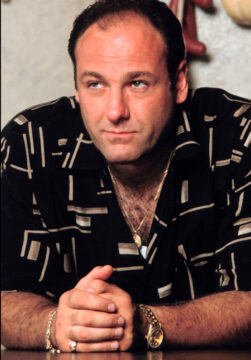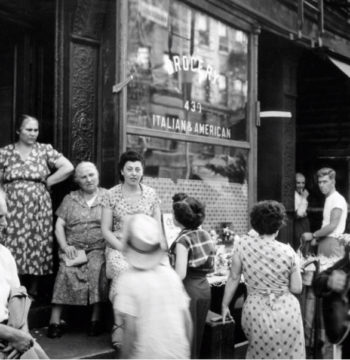by Andrea Scrima
Americans are often smiled upon for their need to identify with their ancestors’ heritage; there’s something naïve and childlike about it, as though we were hoping to find a family somewhere, waiting with open arms for the long-lost child who has finally come home. We describe ourselves with the usual hyphenated ethnic adjectives, we say we’re one quarter this, half that, etc., but the truth is, we create fictional narratives to orient ourselves in a society too young to understand that the identities we claim often have little to do with the culture they purport to originate in. When I think about the cultural clichés we grew up with—the Italian mother leaning out of a tenement window, calling her son home to dinner in a 1960s television commercial; the way we gleefully mimicked her by crying out “Anthoneeeeeeeee!”—I recall the laughter and pantomime and how everyone understood what was meant. But what did it mean? That we were second generation, and thus not as “ethnic” as the old-world Italians portrayed—that we were not Anthony Martignetti racing home through the streets of the Italian north end of Boston on Wednesday, “Prince Spaghetti Day,” but were secure enough in our American identity to mock him? And that in spite of the fondness we felt for our cultural heritage, we’d been enlisted in the very racism that had been leveled at our parents, that had branded them as outsiders, and that had trapped them in a lower social status, a stigma that proved difficult to shed.
 In an attempt to understand my relationship to the Italian-American identity, I recently began watching episodes of The Sopranos, which I avoided when it first aired twenty-five years ago. I was on a nine-month stay in New York at the time, living in a loft on the Brooklyn waterfront, and I remember the ads in the subways—the actors’ grim demeanors; the letter r in the name “Sopranos” drawn as a downwards-pointing gun. I’ve always been bored by the mobster clichés, by the romanticization of organized crime: as an entertainment genre, it’s relentlessly repetitive, relies on a repertoire of predictable tropes, and it has cemented the image of Italian Americans we all, to one degree or another, carry around with us. But the charisma of Tony Soprano, played by James Gandolfini, exerts an irresistible pull: I jettison my critical abilities and find myself binge-watching several seasons, regressing for weeks at a time, losing touch with what I was hoping to find.
In an attempt to understand my relationship to the Italian-American identity, I recently began watching episodes of The Sopranos, which I avoided when it first aired twenty-five years ago. I was on a nine-month stay in New York at the time, living in a loft on the Brooklyn waterfront, and I remember the ads in the subways—the actors’ grim demeanors; the letter r in the name “Sopranos” drawn as a downwards-pointing gun. I’ve always been bored by the mobster clichés, by the romanticization of organized crime: as an entertainment genre, it’s relentlessly repetitive, relies on a repertoire of predictable tropes, and it has cemented the image of Italian Americans we all, to one degree or another, carry around with us. But the charisma of Tony Soprano, played by James Gandolfini, exerts an irresistible pull: I jettison my critical abilities and find myself binge-watching several seasons, regressing for weeks at a time, losing touch with what I was hoping to find.
One day, in the midst of this period, I hear myself talking about the show to a friend, hear the Staten Island accent creeping back in. What part of me is becoming reactivated, what pleasure is there? And what pain? Read more »

 My father, the son of Italian immigrants, was a member of the working class. There were things within reach, and things that were not in reach, and he accepted this. He never pushed his children to broaden their horizons, and would have been satisfied to see them in traditional working-class vocations. When I came home from school eager to show off my grades, he poked fun at me. The prospect of pursuing an intellectual career was alien to him; in his view, taking out student loans to go to college or university was a way for banks to trap the “little guy.” When I presented him with the papers, he refused to sign. There was no discussion. I eventually moved out and managed to get my BFA anyway, and when I wound up as a finalist for a Fulbright, the doctor who performed the general checkup required by the awarding commission—I was still covered by my father’s Blue Cross plan, but only because I was still technically a dependent and it didn’t cost him anything—took him aside and told him that a Fulbright would be “quite a feather in your daughter’s cap.”
My father, the son of Italian immigrants, was a member of the working class. There were things within reach, and things that were not in reach, and he accepted this. He never pushed his children to broaden their horizons, and would have been satisfied to see them in traditional working-class vocations. When I came home from school eager to show off my grades, he poked fun at me. The prospect of pursuing an intellectual career was alien to him; in his view, taking out student loans to go to college or university was a way for banks to trap the “little guy.” When I presented him with the papers, he refused to sign. There was no discussion. I eventually moved out and managed to get my BFA anyway, and when I wound up as a finalist for a Fulbright, the doctor who performed the general checkup required by the awarding commission—I was still covered by my father’s Blue Cross plan, but only because I was still technically a dependent and it didn’t cost him anything—took him aside and told him that a Fulbright would be “quite a feather in your daughter’s cap.”